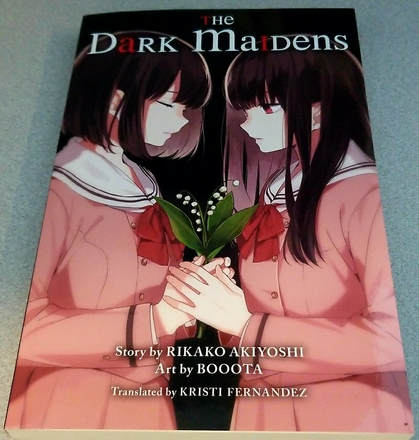Read on.
The Dark Maidens is very similar, albeit a modern day version set in a Catholic missionary, all-girl's private high school in Japan.
Itsumi, the beautiful, kind, intelligent and exceptionally popular (think benevolent queen of the school) president of the school's literature club has died - violently. Whether it is is suicide or murder, the police have not yet determined, but rumors fly around the school that one of the six other members of the school's literature club has murdered her.
One week later, the literature club is meeting for its annual mystery stew slash original short-story-reading event, the event last of the school-year. Itsumi's best friend, Sayuri, formerly the vice-president and now president of the club, has decided to go on with the event despite Itsumi's death, knowing her best friend would want her beloved club to continue this tradition. The twist is that Sayuri has asked each girl to write, instead of a piece of original fiction, a story about their relationship with Itsumi.
What follows is, like in Rashomon, six stories, one for each girl, detailing how close each was with Itsumi, how wonderful Itsumi was to her and casting suspicion on another member of the club. Throughout these stories, bits and pieces (unbeknowst to the girls) of the truth are interwoven. They're not things you can easily pick up on while reading the stories for the first time, but by the end of the novel, I was genuinely impressed with how Akiyoshi seeded "facts" among the fiction.
Aside from that, the last arc of the novel, Sayuri's story, actually written by Itsumi before her death, threw several twists into the narrative. One, I suspected, but others I never saw coming and was not only surprised, but delighted. The last few pages of the work, especially, throw all the shadows and murkiness of what's come before into stark relief - and in a brutal fashion I could never have expected from the rest of the novel.
If it wasn't obvious, I greatly enjoyed the work. If I have any complaint, it's a personal one rather than a real critique of the work and it's only because I am a westerner reading a novel originally written for Japanese audiences, that being that there's a great deal of space devoted to explaining various Christian holidays and Catholic ceremonies. This is entirely understandable for a Japanese audience, as very few would be familiar with these concepts, but as a westerner, they sort of dragged the narrative down in a few places.
Don't, however, let that deter you. Overall, this is a great novel. I literally couldn't put it down as I read and ended up reading it in one sitting. Very much recommended.


 RSS Feed
RSS Feed